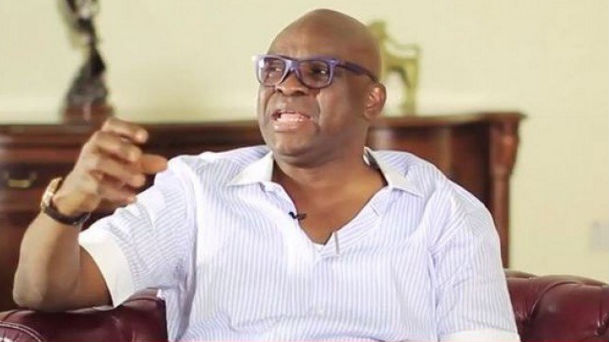The Chief Judge of the Federal High Court, Justice Adamu Abdu-Kafarati, has granted the request of the Economic and Financial Crimes Commission (EFCC) and re-assigned the trial of the immediate past governor of Ekiti State, Ayodele Fayose.
Before the transfer, the EFCC had called 13 out of the 15 witnesses it listed, in the trial, which started last year November at the Federal High Court, Lagos and has enjoyed accelerated hearing.
The trial will now commence afresh before Justice Chukwujekwu Aneke following the transfer of the case from the courtroom of Justice Mojisola Olatoregun.
By a letter dated May 23, 2019, and addressed to Justice Olatoregun, Justice Abdu-Kafarati wrote;
“I refer to the petition of EFCC on this case and your Lordships comments thereto.
“It is apparent that the prosecution has lost confidence in the judge trying this case and justice must not only be done but must be seen to have been done, I hereby transfer this case to Hon. Justice C. J. Aneke for hearing.”
The letter was copied to Justice Aneke, the acting EFCC Chairman, Ibrahim Magu, and the Deputy Chief Registrar, Litigation of the court, Ms. Clement Ende.
By a petition dated March 21, 2019, and signed by Magu, the EFCC had asked Justice Abdu-Kafarati to transfer the trial to another judge of the court.
Magu noted that EFCC was withdrawing its confidence in the trial judge, Justice Olatoregun after an altercation between her and the EFCC counsel, Mr Rotimi Jacobs, in open court on the 20th of March, 2019.
On the said day, Justice Olatoregun was said to have engaged in unrestrained, unprovoked, and unwarranted vituperations against the prosecuting counsel which the petition says are indicative of the fact that she has an axe to grind with Mr Jacobs and the EFCC.
The petition said further that with this recent attitude, hostility and intimidation, the judge has confirmed the fears and doubts of the Civil Society Organisations and has made the commission agree with them that it cannot get justice on the case in her court.
The petition concluded by saying that, it is obvious that Justice Olatoregun cannot dispassionately and transparently try the case and the EFCC is constrained to state that it has lost confidence in her ability to do so.
The EFCC, therefore, requests a transfer of the case to another judge of the court for trial
In his reaction to the EFCC’s move, Fayose’s counsel, Ola Olanipekun (SAN), had said the petition was misconceived, unsustainable and frivolous.
He described the petition as a subtle attempt to intimidate and stampede the court into doing what EFCC liked or wanted in disregard of provisions of the Administration of Criminal Justice Act (ACJA) 2015 and the right of the first defendant, Fayose to expeditious hearing of his case, as well as the need to avoid wasting public funds and scarce judicial time on de-novo trial.
No party in a criminal case should be allowed to choose or determine the Judge to hear its or his case. Granting such a request for transfer will constitute a dangerous precedent, which will imperil the much-cherished independence of the judiciary as the bastion of the rule of law, he said.
Olanipekun argued further that the petition requesting transfer of the part-heard criminal case in which prosecution had already called 10 witnesses is legally misconceived having regard to provisions of Section 98(2) of the ACJA 2015 and the recent Court of Appeal decision in the case of F.R.N V. LAWAN (2018) LPELR-43973 (C-A).
Fayose is on trial for allegedly receiving and keeping N1.2 billion and $5 million allegedly stolen from the Office of National Security Adviser (ONSA) contrary to the Money Laundering Act.
He had pleaded not guilty when he was arraigned on an 11-count charge last October 22.
The EFCC said Fayose and Biodun Agbele, who is facing a different charge, allegedly took possession of N1, 219,000, 000 on June 17, 2014, to fund the former governors 2014 gubernatorial campaign.
The commission said Fayose reasonably ought to have known that the money formed part of the proceeds of an unlawful act, to wit: criminal breach of trust/stealing.
EFCC said Fayose, on the same day, received a cash payment of $5million from Obanikoro, without going through a financial institution, the sum having exceeded the amount authorised by law.















